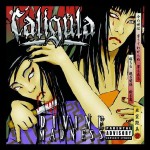Maybe it’s the Japanese characters drawn on the album cover. Or the slew of guest appearances. Or the brooding, grotesque but conscious lyrics. Whatever the reason, it is hard to tell the difference between Caligula’s Divine Madness and a mid-’90s Wu-Tang Clan project. Fifteen years ago, an artist from New Orleans producing an album like Divine Madness would have been unheard of. In fact, an artist not named RZA producing an album like this would have been almost impossible. Haunting piano keys, thick bass lines and dark horns make this album as ominous as the image of a decapitation shown on the album cover.
Caligula’s lyrics don’t do anything to lighten the mood. One moment, he’s waxing poetic about Orson Wells; the next, he’s kicking women in the stomach to induce labor. In between, he’s lamenting over lives lost in Katrina and socioeconomic incongruities. Caligula’s gravely, unrelenting and intense voice acts almost as part of the instrumentals, punching the ears as hard as the snares. Just listen to the thumping “Godless Rain” and “Bronson vs. Kersey” to hear an MC totally at home over a beat.
But, like a Wu-Tang album, the highlights come during the posse cuts. “Dysfunctional Family” features Lyrikill, Impulss, Pumkinhead, Scott Bluntz and the Monsta Island Czars. Each MC slices through the throwback beat with inspired ferocity, recalling the freestyle ciphers of hip-hop’s heyday.
Divine Madness plays like a horror flick with few hooks interspersed between non-stop poetic bars and obscure movie clips. Enjoy, but try not to listen right before you fall asleep if you want to avoid nightmares.





